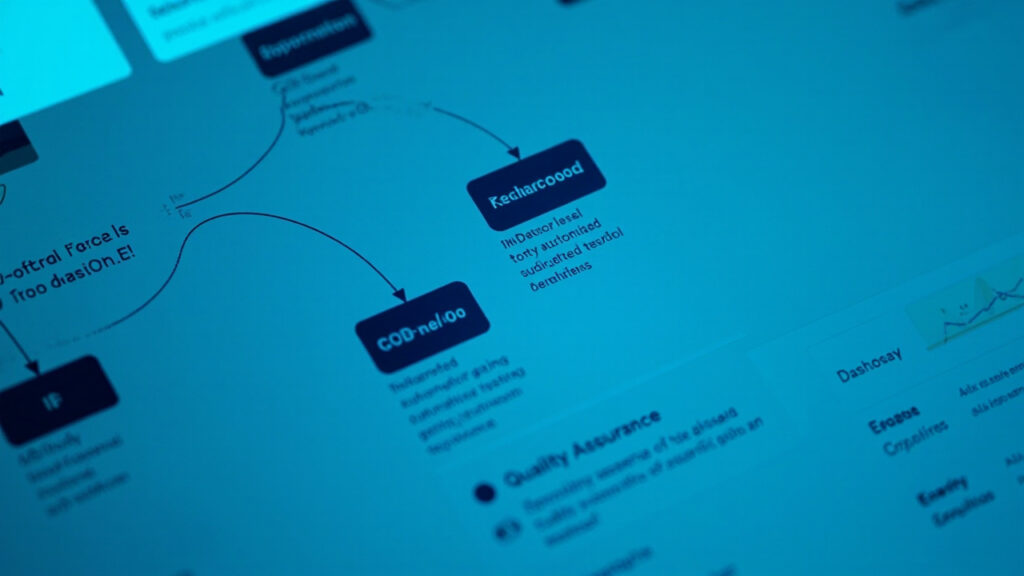In the ever-evolving world of software development, the role of quality assurance (QA) has become increasingly complex and vital. As applications grow in sophistication, traditional testing methods often fall short, leaving developers and companies grappling with bugs and inefficiencies that can hinder growth and customer satisfaction. This comprehensive guide explores the transformative impact of artificial intelligence (AI) in software testing, highlighting the pain points in traditional methods and how cutting-edge solutions like GenQE are redefining the landscape.
Understanding the challenges in traditional testing setups is crucial for appreciating the advancements brought by AI. Manual testing methods are not only time-consuming but also prone to human error, making them less effective in today’s fast-paced development environments. Moreover, as software systems become more integrated and complex, the need for a scalable, efficient testing solution becomes undeniable.
This article will guide you through the multiple facets of AI-powered software testing. By integrating intelligent tools such as GenQE, organizations can achieve more robust software quality, reduce costs, and accelerate time to market. Read on to discover how AI is revolutionizing software testing, providing you with actionable insights and practical advice to leverage in your projects or organization.
The Limitations of Conventional Software Testing

Traditional software testing methods have served the development community for decades; however, they come with inherent limitations that can impede progress in the modern digital landscape.
Inefficiency and High Costs
Manual testing requires significant human effort and time, making it a costly endeavor with a high probability of errors. The repetitive nature of creating and executing test cases manually leads to increased operational costs and extended development cycles. The labor-intensive aspect also introduces a high risk of burnout among quality assurance professionals, further affecting productivity and increasing turnover rates.
Scalability Issues
As applications expand in scope and complexity, scaling traditional testing methods becomes a logistical challenge. Testers often struggle to keep pace with the rapid deployment schedules and the integration of new features. This can lead to bottlenecks where the testing phase becomes the critical path in the software release process, delaying launches and updates crucial to staying competitive.
Lack of Comprehensive Coverage
Manual testing often fails to cover every possible scenario, leading to gaps in application performance and user experience. This incomplete coverage can result in software products that are buggy or fail to meet user expectations. The inability to simulate complex user interactions or test across various environments and devices compounds this problem, leaving critical flaws undetected until after release.
AI-Driven Test Generation: A Game Changer

One of the standout features of AI-enhanced testing platforms like GenQE is the AI-driven generation of test cases. This technology significantly reduces the dependency on manual test creation.
Automating the Tedious
AI algorithms analyze software requirements and historical data to automatically generate comprehensive, effective test cases. This not only speeds up the testing process but also enhances the accuracy and relevance of test scenarios. For example, by integrating user behavior data, AI can create tests that more accurately reflect real-world usage, catching issues that might not be apparent in conventional test cases.
Enhancing Test Coverage
With AI, it’s possible to create a wider array of test cases that consider various user behaviors and edge cases, thus ensuring a more thorough examination of the software’s capabilities. This comprehensive coverage is vital for applications in critical domains such as healthcare and finance, where errors can have significant repercussions.
Reducing Human Error
By minimizing the need for manual input in the test creation phase, AI-driven test generation helps reduce the likelihood of human error, leading to more reliable software delivery. This also frees up QA professionals to focus on more strategic tasks such as test analysis and refining quality control processes.
Smart Test Execution: Prioritizing What Matters

Efficient test execution is critical for timely software releases. AI-powered platforms like GenQE excel in smart test execution, which prioritizes test cases based on risk and impact.
Risk-Based Testing
This approach ensures that high-risk areas of the application are tested first, optimizing testing efforts and focusing resources on critical issues that could have a higher impact on the final product. For instance, if a new payment gateway integration is added to an e-commerce app, AI can identify and prioritize tests around this feature due to its high financial stakes.
Dynamic Test Scheduling
AI tools can dynamically schedule tests based on code changes, ensuring that the most relevant tests are executed in response to recent updates. This not only keeps testing efforts aligned with development but also reduces the testing cycle time by avoiding unnecessary tests.
Faster Feedback Loops
By streamlining test execution, AI helps developers receive quicker feedback on their work, allowing for rapid adjustments and improvements. This is especially crucial in agile environments where speed and adaptability are key to project success.
Self-Healing Automation: Adapting to Changes

One of the most innovative aspects of AI in software testing is self-healing automation. This feature allows test scripts to automatically adjust to changes in the user interface (UI) or application environment.
Minimizing Maintenance
Self-healing capabilities reduce the need for manual updates to test scripts, significantly cutting down on maintenance time and costs. This is particularly beneficial in agile and continuous deployment environments where frequent changes to the software can otherwise lead to a high volume of test script failures.
Enhancing Test Stability
By automatically adapting to changes, self-healing tests are less likely to fail, ensuring more stable and reliable testing processes. This adaptability is crucial for maintaining the integrity of the CI/CD pipeline and ensuring that automated tests continue to provide value over time.
Continuous Improvement
As the AI learns from each test execution, it continuously refines the self-healing algorithms, improving the resilience and accuracy of automated tests over time. This learning process is enhanced by feedback loops that integrate test results to fine-tune performance.
Comprehensive Test Coverage Across Platforms

Ensuring that an application performs well across different environments is crucial. AI-enhanced tools like GenQE provide extensive test coverage across platforms, including web, mobile, APIs, and cloud services.
Multi-Platform Compatibility
AI-driven testing tools are designed to seamlessly integrate with various platforms, ensuring that applications deliver consistent user experiences across all devices and operating systems. This is essential in today’s multi-device world, where users may interact with applications on a range of devices from smartphones to desktop computers.
Cloud-Based Testing
With the integration of cloud environments, testing becomes more scalable and accessible, allowing teams to execute tests efficiently and at scale. Cloud platforms can also simulate a wide range of network conditions and hardware configurations, providing a more robust testing environment that can adapt to the needs of a diverse user base.
Real-World Simulation
AI tools can simulate real-world scenarios and user interactions, providing developers with insights into how applications perform under different conditions. This capability is invaluable for identifying potential usability issues before they affect end-users, ensuring a smoother deployment and a better user experience.
Integrating AI-Powered Testing in DevOps

The incorporation of AI-powered testing tools like GenQE into DevOps practices represents a significant leap forward in software development. This integration facilitates continuous testing and delivery, enhancing both speed and quality.
Seamless CI/CD Integration
GenQE easily integrates with existing CI/CD pipelines, such as Jenkins or GitHub Actions, automating tests within the software development lifecycle without disrupting existing workflows. This seamless integration helps maintain the pace of continuous integration and delivery, essential for agile development practices.
Enhancing Developer Productivity
By automating routine testing tasks, developers can focus more on creative problem-solving and innovation, boosting overall productivity and job satisfaction. This shift in focus from mundane tasks to more engaging aspects of development not only improves output but also enhances team morale.
Proactive Defect Detection
AI-powered tools proactively detect potential defects before they become problematic, allowing teams to address issues early in the development process. This early detection is crucial for preventing defects from progressing through the development pipeline, reducing the cost and effort required for remediation.
Conclusion: Embracing the Future of Software Testing

As the digital landscape continues to evolve, the integration of AI into software testing is no longer just an option but a necessity. Tools like GenQE are at the forefront of this revolution, offering capabilities that transcend the limitations of traditional methods. By embracing AI-powered testing solutions, organizations can not only enhance the quality and reliability of their software but also achieve significant gains in efficiency and cost-effectiveness.
For those looking to stay competitive in the fast-paced world of software development, adopting intelligent testing solutions such as GenQE is a strategic move towards a more innovative and successful future. Explore how these advanced tools can transform your testing processes and lead your projects to success.
Discover More Innovative Solutions
Want to learn more about the tools and technologies discussed in this article? Explore how these innovations can be tailored to your specific needs and workflow requirements.
Our team of experts is available to answer your questions and provide personalized insights into how modern solutions like GenQE can address your specific challenges.